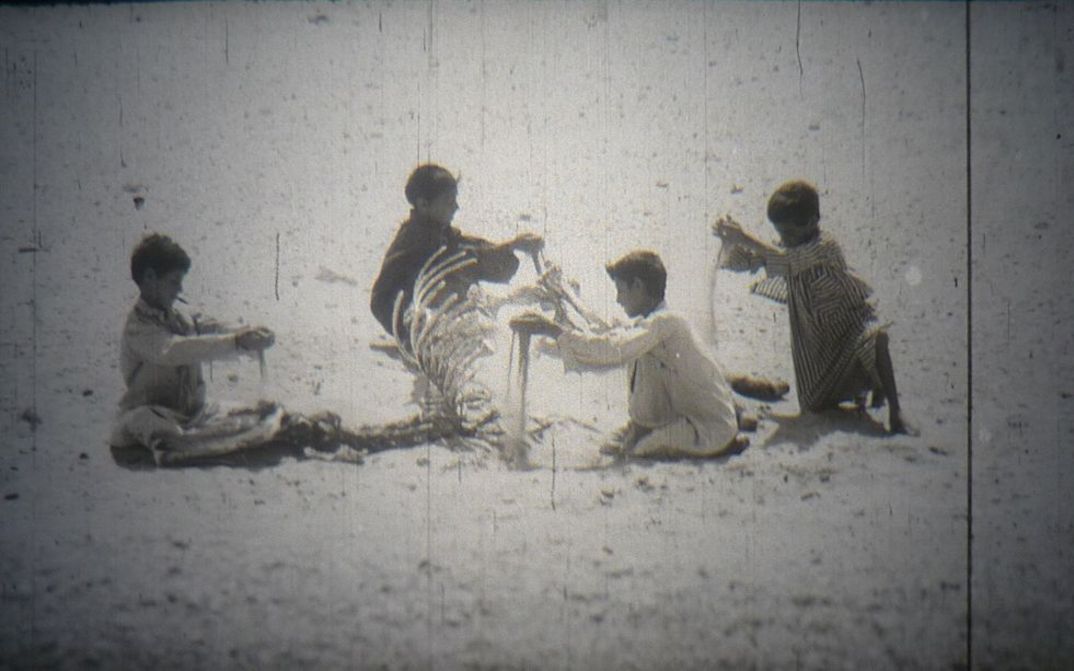
Mon 12.06.
16:15
Director
Omar Amiralai
Syria / 1972-1974
90 min.
/ Original version with English subtitles
Cinema
Arsenal 1
zu den Ticketszu dem KalenderGuests: Ismet Amiralai
Omar Amiralay’s first feature-length film presents a detailed portrayal of life in Al Mouwayleh, a village in northeastern Syria. The film crew immersed themselves in the area for several months, using a village as a lens to examine the country’s issues. “We made no claim in this film,” said the director in a 1976 interview, “to deliver a complete picture of life in this village. We [...] attempted, as much as possible, to reproduce the most important socio-economic and cultural traits of the village, which are most likely similar in their power structures to the traits of other Syrian villages.” In this, Amiralay observes and analyzes the tension between the government and landowners on the one hand and the farmers on the other.
A copy of the film has been in the Arsenal archive since its screening at the Berlinale Forum in 1976 (then: International Forum of New Cinema). Earlier this year, Ismat Amiralai gave his brother’s cinematic estate to the Arsenal.
In the Forum catalog, a foreword by the director and Sadala Wannous (script) about the film as well as a conversation between Omar Amiralay and Guy Hennebelle were published for AL HAYATT AL YAWMIYAH FI QARIAH SURIYAH. The following is an excerpt from that catalog. The entire catalog sheet can be downloaded as a PDF (German only).
[…]
Hennebelle: What were the shooting conditions like? How were the encounters with both the villagers and the authorities?
Amiralay: […] Our communication with the various existing parties was extremely difficult. We found ourselves in a quandary between two broad reactions: on the one hand, the farm workers, who perceived us as representatives of the state, simply because the license plate of our car was green, which was enough to arouse in them more caution than curiosity, if not fear. On the other hand, the regional and local authorities, who regarded us with suspicion, despite the official document we possessed. First of all, the authorities are not used to such care from the capital, and secondly, they were not too pleased with our interference in their personal business, as we asked too many questions for their taste.
In view of this situation, we adopted a neutral attitude towards the two existing camps, especially concerning our contact with those in charge. The most important thing for us was to obtain a basic knowledge of the subject by all means.
We were encouraged by the conviction that the strong interest of the official authorities, which had been caused by our arrival, would gradually diminish and in the end would disappear altogether ... And we were to be proven right. This bureaucracy is not accustomed to working long hours: It was quickly exhausted by our repeated steps, which in the end cost them so much additional work and which ultimately could not be compensated for.
During our second stay in the village, this time with the aim of establishing a relationship with the farmers, we noticed that the attitude of the members of the teachers' union toward us had improved. At the same time, we had changed the methods of our survey and of our integration into the milieu. We could only gradually reach our goal. It was not until the residents had become accustomed to our presence and the presence of our equipment that we began to hold the first dialogues with them. Nevertheless, when we later looked at the samples, it was by no means encouraging. We realized how inadequate our cunning attempts of approaching the farmers were and how they did not allow us to come to an open and free dialogue. Our firm assurances that we would fully respect their point of view in the film did not seem credible enough for them.
Most of the time, our interviews with the farmers showed either an unconscious cunning that mystified everything or a conscious openness; but this also proved insufficient to give a true picture of the class struggle that continued under the surface of the multiple relationships between the various parties addressed.
This class struggle became very palpable in the regional elections that took place throughout the country while we were shooting the film, thus, revealing the various layers that were before hiding under the surface concerning the afformentioned relationships. In our village there were three candidates: One represented the sheikhs, i.e. the landowners, the other (a union leader) represented the farmers, and the third benefited from the existing contradictions and declared himself as independent. As a result of the electoral victory of the third, the farmers demonstrated for an increased support for the person in charge of the union, because they were worried about losing the socialist advantages they had previously fought for and won at the price of great sacrifices. This new element in production relations could not but irritate the landowners' representatives, who began to see in it the sign of a great danger. Therefore, under the guise of a tribal feud, they plotted the assassination of the person in charge of the union, which ultimately excused them to expel the farmers and their families from their fields and to threaten them with reprisals.
In this new situation, the farmers began to analyze the situation in front of the camera with a surprising sincerity and to accuse those responsible, so that it was merely necessary to record what was happening and what was being said. We were very surprised by this determination. As Marxists, which we believed ourselves to be, we should have known that these people, who were treated as strangers in their own country, had nothing more to lose. […]
Excerpt from: Guy Hennebelle, „Le cinéma syrien“, in „L'Afrique littéraire et artistique“ Paris, No. 36, 1975, p. 87